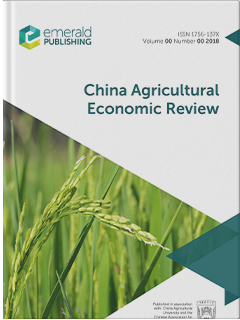What determines the development of a rural collective economy? A fuzzy set qualitative comparative analysis (fsQCA) approach
IF 4.6
2区 经济学
Q1 AGRICULTURAL ECONOMICS & POLICY
引用次数: 2
Abstract
PurposeThis study explores configurations that promote the development of collective economies in China's rural villages and reveals the multiple development pathways that otherwise remain relatively unexamined in the literature.Design/methodology/approachThe authors obtained first-hand representative case data from 20 villages in 12 counties in 5 provinces in East, West and Central China via fieldwork and applied fuzzy set qualitative comparative analysis (fsQCA) to conduct a configurational comparative study of the development of village collective economies.FindingsThis paper identifies five factors in the current literature that affect the development of village collectives, based on an “entrepreneur–situation” analytical framework. Using the fsQCA method, this study further obtains two main configurations of conditions that culminate in the growth of rural collective economies in China. The first solution is the “top-down path”: When entrepreneurial leadership (EL), resource endowment (RE) and government assistance (GA) are present, a village collective economy will experience a high level of development, irrespective of policy support (PS) and villagers' participation (VP). The second solution is the “bottom-up path”: When EL, VP and PS are present and GA is not present, a village collective economy will experience a high level of development, irrespective of RE. In both situations, EL stands out as the core condition for the development of village collective economies, implying the need for the government to vigorously cultivate the entrepreneurial skills and aspirations of village cadres.Originality/valueTaking a configurational perspective and using an fsQCA approach, this research constructs an “entrepreneur–situation” analytical framework to investigate the key combinations of factors and pathways involved in the high level of development of Chinese village collective economies.什么决定农村集体经济的发展?一种模糊集定性比较分析方法
目的本研究探讨了促进中国农村集体经济发展的结构,并揭示了文献中相对未研究的多种发展途径。设计/方法论/方法作者通过实地调查获得了来自东、西、中5个省12个县20个村的第一手代表性案例数据,并应用模糊集定性比较分析(fsQCA)对村集体经济发展进行了配置比较研究。发现本文基于“企业家-情境”分析框架,确定了当前文献中影响村集体发展的五个因素。运用fsQCA方法,本研究进一步获得了中国农村集体经济发展的两种主要条件配置。第一个解决方案是“自上而下的路径”:当企业家领导力(EL)、资源禀赋(RE)和政府援助(GA)存在时,无论政策支持(PS)和村民参与(VP)如何,村集体经济都将经历高水平的发展。第二种解决方案是“自下而上的路径”:当EL、VP和PS存在,而GA不存在时,无论RE如何,村集体经济都将经历高水平的发展。在这两种情况下,EL都是村集体经济发展的核心条件,这意味着政府需要大力培养村干部的创业技能和抱负。独创性/价值本研究采用配置视角,采用fsQCA方法,构建了一个“企业家-情境”分析框架,以调查中国农村集体经济高水平发展所涉及的因素和途径的关键组合。
本文章由计算机程序翻译,如有差异,请以英文原文为准。
求助全文
约1分钟内获得全文
求助全文
来源期刊

China Agricultural Economic Review
AGRICULTURAL ECONOMICS & POLICY-
CiteScore
9.80
自引率
5.90%
发文量
41
审稿时长
>12 weeks
期刊介绍:
Published in association with China Agricultural University and the Chinese Association for Agricultural Economics, China Agricultural Economic Review publishes academic writings by international scholars, and particularly encourages empirical work that can be replicated and extended by others; and research articles that employ econometric and statistical hypothesis testing, optimization and simulation models. The journal aims to publish research which can be applied to China’s agricultural and rural policy-making process, the development of the agricultural economics discipline and to developing countries hoping to learn from China’s agricultural and rural development.
 求助内容:
求助内容: 应助结果提醒方式:
应助结果提醒方式:


